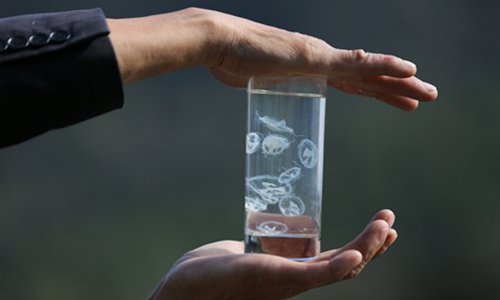HOME >> CHINA
Tiny, endangered jellyfish thrive in wastewater treatment facility
Source:Global Times Published: 2019/10/14 16:11:25

A man holds a bottle containing freshwater jellyfish, or Craspedacusta sowerbii, in Linyi, East China's Shandong Province. More than 300 rare jellyfish were found in a man-made pool on Yimeng Mountain. Photo: IC
An extremely rare species of freshwater jellyfish the size of a penny, that has existed for 550 million years and predates dinosaurs, was recently spotted in an advanced wastewater treatment facility in South China.
The freshwater jellyfish, or Craspedacusta sowerbii, were discovered in the facility at Guilin University of Technology in South China's Guangxi Zhuang Autonomous Region, Beijing-based Science and Technology Daily reported on Sunday.
The facility was built in early 2017 to improve water quality of the lake on the campus. During a water quality inspection in September 2017, creatures resembling jellyfish were found in water samples, Zhang Wenjie, an environmental scientist and engineering professor at the university, told the paper.
Only a few of the creature were seen in the first sample, but they reappeared in September 2018 and September 2019, leading Zhang to run a test that identified the creatures as freshwater jellyfish.
Listed as a critically endangered species in 2002, the freshwater jellyfish are also called the "water panda," the report said.
Having a diameter between 15 to 25 millimeters and tentacles of about 20 millimeters, the "living fossils" are the only known jellyfish that lives in fresh water, according to the Daily.
They thrive in clean, clear water that's between 25 C and 32 C, and feed on animal plankton, which is why they are often observed between June and October, when the water is at the right temperature and there is sufficient food.
Zhang said that the freshwater jellyfish not only looks beautiful, they are also a key species in the study of evolution, giving them high academic value.
Zhang wants the favorable environment protected for the jellyfish and the continued treatment of wastewater before it is released into natural waters.
Freshwater jellyfish once lived throughout China, but because of pollution they are now only found in a handful of places, the report said.
Global Times